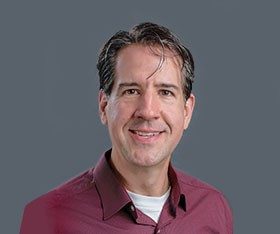Gregory Tew, Ph.D.

Gregory Tew
Professor, Polymer Science and Engineering
University of Massachusetts Amherst
B.S., Chemistry, North Carolina State University, Raleigh
Ph.D., Materials Chemistry, University of Illinois at Urbana-Champaign
Gregory Tew has been a professor of polymer science and engineering at the University of Massachusetts Amherst for 13 years. He leads a research group that focuses on synthesizing polymers that interact with biological systems, for use with medical applications. Specifically, they study polymers that affect the human immune system, for use with new vaccines and improving the body's acceptance of medical implants and transplant organs. One of Tew's big projects is an investigation of polymers that can trigger immune responses to fight cancer cells.
His graduate studies focused on materials chemistry, specifically, self-assembly, a process where surfaces, chemical conditions, or other factors induce molecules to come together in specific arrangements and formations. After a one-year postdoctoral fellowship, he found his current position by scouring the job postings in Chemical and Engineering News and other scientific publications.
Today, he runs a research laboratory, where he supervises a group consisting of 10–15 Ph.D. candidates, post-doctoral fellows, and undergraduates. He also teaches classes, and he currently serves as the graduate program director for his department.
I am a self-starter, I’m driven, and passionate about what I do.
Typical day on the job:
As an academic, "typical" days vary ― one day I teach class, which involves lecturing, preparing for lecture, and interacting with the students in class. On another day, I may be attending a professional meeting out of town. I have routine meetings with my students (1–4 hours per day). I no longer conduct experiments myself, but I manage students and postdocs who perform the experiments. This includes a lot of mentoring, as well as applying for grants to keep everything funded. I also attend routine meetings related to administration of the department and university.
I am away from my workplace on travel from one to five days a month, on average. This may be as a guest lecturer at other universities, or visiting companies that are interested in my research. I attend several international, national and regional meetings, including Gordon Conferences and ACS meetings.
Work environment:
I work in an office, which I do not share with anyone. It has a computer, seated desk, and standing desk. I am often in a meeting with three or more people, and this may happen in my office, a conference room on campus, another office, or a coffee shop.
Work schedule:
I work about 60 hours a week ― long hours are required. Email tends to be more or less 24 hours a day except when I am sleeping or on a plane (I still am unplugged on the plane).
Best productivity trick:
I make well-defined to-do lists. And I actually shut down the email sometimes.
Skills or talents that make you a good fit for your job:
I am a self-starter, I’m driven, and passionate about what I do.
Best career advice you've received:
I have had tremendous mentorship, and for that I am deeply grateful. Good mentorship is the best advice. When I was a student, I sought out a variety of mentors. Each one excelled at something different, so I learned different things from each one. I realized that it's my career, so I had to take the initiative to find people who could teach me.
Essential habit you wish you'd started earlier:
Time management ― I could work 100 hours a week and there would still be things to do. I had to learn to set priorities and make sure that the most important things get done. I also had to learn not to spend an excessive amount of time trying to achieve perfection on any one thing while letting other important things go undone. My do-list is my responsibility.
Favorite ACS resource:
Involvement in the ACS Division of Polymer Chemistry has been essential for my career. The division is a vibrant and tremendously supportive community. It also provides an engaged and interactive approach to the broader ACS community.

